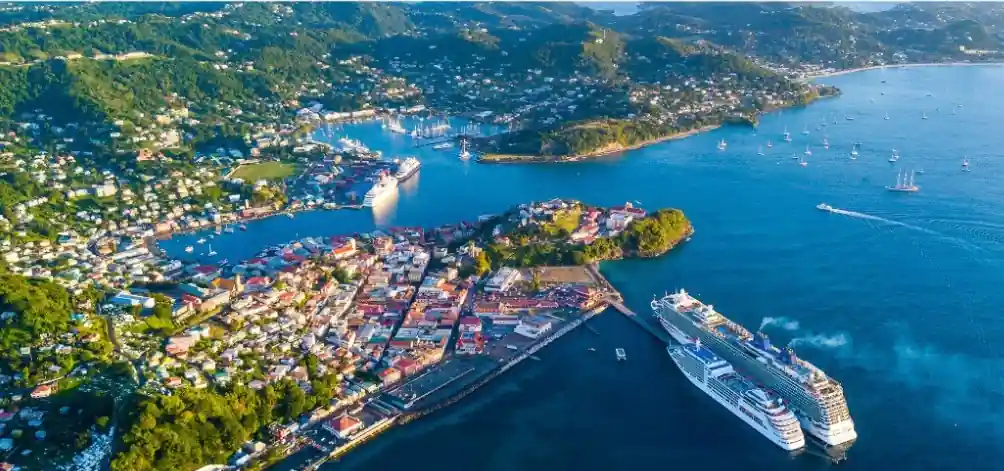PM Dickon Mitchell calls for global accountability and local innovation at Concordia Summit
In a discussion with founder of DLO Energy Resource Group, Linda Mabhena-Olagunju and the President of COP29, Mukhtar Babayev, Mitchell pointed to the Caribbean’s small share in global carbon emissions, but he continued that climate change disproportionately affects Small Island Developing States (SIDS) like Grenada.
24th of September 2024

Grenada’s Prime Minister Dickon Mitchell, speaking at the 2024 Concordia Summit, said there is a need for global accountability in shifting to renewable sources of energy as it mainstreams innovation at the local level.
In a discussion with founder of DLO Energy Resource Group, Linda Mabhena-Olagunju and the President of COP29, Mukhtar Babayev, Mitchell pointed to the Caribbean’s small share in global carbon emissions, but he continued that climate change disproportionately affects Small Island Developing States (SIDS) like Grenada.
“The private sector has to play a very critical role in this kind of transition,” Mitchell noted. “We believe the actual generation of renewables should be left to the private sector,” he said. The government is building infrastructure that supports such initiatives.
The expressions of interest in large-scale projects were well highlighted by Dickon Mitchell with regard to the fact that the energy generation and renewable energy development is setting Grenada to be a principal key player.
Among the significant challenges that Dickon Mitchell spoke about is the energy cost in the Caribbean, which implies that the local manufacturing in the region is less competitive. This represents one of the major necessities for an economy in developing countries like Grenada, as most of them have to import technologies related to renewable energy like solar panels.
Linda Mabhena-Olagunju, in a warning to other countries, stated for instance that South Africa alone imported ZAR 17 billion worth of solar panels. Unless the other nations such as Grenada, develop indigenous manufacturing capacities, they are bound to be dependent as such.
PM Dickon Mitchell emphasized that education and training would best equip Grenadians to this renewable energy sector. He indicated that through solar panel installation, maintenance, and other renewable technologies, such as wind and geothermal power, many more jobs can be created.
“The shift to renewable energy calls for new skills,” he noted, “and it gives us a chance to empower our people with the knowledge and expertise required for this transition.”
One of the special vulnerabilities that Mitchell regards as concerns for Grenada is its susceptibility to hurricanes.
PM Dickon Mitchell stressed that the nation must look at conceptualizing building renewable energy systems that can withstand natural disasters and that, for example, the idea of a removable solar panel that could be taken down before a hurricane and then be reassembled just after such a disaster.
He said that this is an opportunity for Grenada to lead in this field with the kind of research and technology fitting Grenada’s unique environment.
Mitchell also pointed out the global funding problem with the transition towards renewable energy. He said developing countries have pledged financial assistance to combating climate change adaptation but most of that money hasn’t yet come through.
“We are not contributing to this global climate crisis, yet we bear its impact,” he said. Mitchell urged the developed global allies to meet their funding pledge, a part of the $100 billion commitment, to assist developing countries in switching to clean energy sources.
Those pledges on the table seem rather inauspicious, and their failure will raise serious questions about the credibility of the global climate process, PM Dickon Mitchell said.
He clearly stated that small island countries like Grenada are ever ready to adopt innovation and equip their people for a green economy but would require the global financial support along with local strategies of resiliency to make the transition sustainable.
It is within this context that Mitchell remarked, “megawatts of funding, not just megawatts of talk”. His leadership on this road of global accountability but local solutions well positions him as the forward-thinking advocate to climate justice and renewable energy development within the Caribbean.
Latest
- Dominica: Dainisha Eusebe crowned Miss Dominica 2026 at Carnival City
-
St Kitts’ Marsha Henderson takes OECS Tourism Chair, calls for greater regional integration -
Regional Leaders congratulate PM Mia Mottley on third consecutive election victory in Barbados -
PM Terrance Drew meets PM Roosevelt Skerrit to strengthen CARICOM ahead of 50th Heads of Government Meeting -
BLP Secures Third Consecutive Term in Barbados, Sweeps All 30 Parliamentary Seats
Related Articles

6th of December 2024

4th of December 2024

2nd of December 2024


28th of November 2024

27th of November 2024

24th of November 2024

